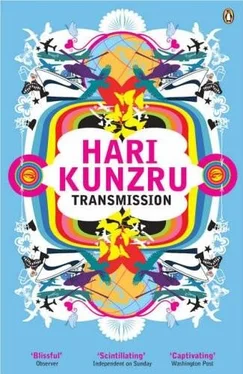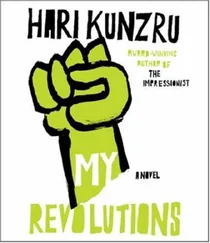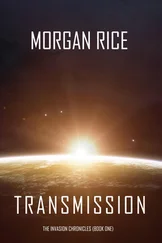‘You know — looking at stuff? He’s peering over people’s shoulders. Asking them what they’re working on. He says he just wanted to get a feel for our culture. He seemed to know you were away.’
‘That fucker. That fucking fucker. He didn’t even have the decency to — oh shit — Kika, do something for me? If he goes anywhere near Paul’s section, try to distract him. I don’t want him looking over any financials until I’m there. I’m going to hop in a cab right now —’
‘How am I supposed to do that? He’s just wandering around, chatting.’
‘I don’t know. Be creative. Make him tea. Flash your tits.’
‘Guy, that’s not called for.’
‘Kika, just go the extra mile, OK? I’m coming as fast as I can.’

‘Great to see you, Yves,’ lied Guy. ‘Welcome.’
Yves reached up, shook Guy’s hand and blandly lied back, something about flight connections, chance, a morning to kill. It was an awkward moment. To welcome him to Tomorrow *, Guy had to pretend that Yves was not already ensconced on the Balzac chair in the brainstorm zone, reading through a sheaf of spreadsheets.
For a second, they stared at each other, then broke eye contact and looked out in opposite directions over the converted Shoreditch factory. Tomorrow *, as Guy liked to remind visitors, was not so much an agency as an experiment in life — work balance. Guy’s stated commitment to his staff was to provide an environment that fostered creativity and innovation, while spurring them on to excellence — an environment that made work fun and fun work. That environment was made up of three floors of open space with large windows, exposed brickwork and polished boards scarred by the installation and removal of heavy machinery, now dotted by random clusters of tables and workstations, the outcome of an unsuccessful experiment with hot desking. In return for Guy’s commitment to them, around eighty people were at that very moment balancing life and work by researching, auditing, analysing, conceptualizing, quantifying and qualifying, visualizing, editing, mixing and montaging, arranging, presenting, discussing, and all the other activities that Guy liked to group under the general heading getting one’s hands dirty at the brandface, by which he meant convincing people to channel their emotions, relationships and sense of self through the purchase of products and services.
‘Shall we go upstairs?’ he asked.
‘No,’ said Yves. ‘We sit down here. It is comfortable.’ He pointed to a beanbag next to the armchair. The idea of being invited to take a seat in one’s own company HQ was a new sensation for Guy, and not one he found pleasant. The offer of the beanbag was clearly a trap, but he had to make the best of it, so he dragged the bulky leatherette sack to a place where he could at least lean his back against the pinball machine. In this position his eyeline was almost level with Yves’s own.
Yves nodded sagely, the nod of a man with an INSEAD MBA giving his professional approval of a meeting tactic. Guy noticed with a feeling of impotent rage that the papers in his hands were recent company expenditure records. He forced himself to smile. ‘Are you sure you wouldn’t rather go upstairs?’
‘It is OK here.’
Guy had to do something to regain the initiative. To buy time, he pretended he had to take a call on his mobile, and, making a ‘one minute’ gesture to Yves, clamped the handset to his ear and took a walk in the direction of the front desk. Circling in reception, he tried to think. A surprise visit by Yves Ballard could be interpreted in a number of ways, none of them good. Yves was a partner at Transcendenta, the venture-capital firm whose investment had helped Tomorrow * get off the ground. Recently a certain frostiness had appeared in Transcendenta’s communications with Tomorrow *. There was talk of setting performance targets and realizing a near-term capital return. Guy glanced back at the Frenchman. Yves was dressed in the international business-casual uniform he always wore: chinos, penny loafers which showed a lot of argyle sock, a blue cotton button-down shirt with the logo of a conservative fashion house on the breast pocket — clothes as internationally acceptable and context-free as his forty-something face, with its pleasant yet somehow under-used features. Those features had currently composed themselves into a surface of studied placidity, a treacherous ornamental pond of a face. Yves was here to talk money, no doubt about it.
Guy flipped his phone shut and walked back towards the brainstorm zone, which was thought of by most Tomorrow * staffers as the recreation area, containing as it did soft furnishings, a TV and a PlayStation. Yves was idly examining the antique industrial sewing machine, salvaged by the renovating architects from the building’s previous life as a garment sweatshop. Guy liked to take new members of staff to stand by the machine. Your inspiration should come from there, he would tell them. That hunk of metal understands the true meaning of work.
‘You’ve taken on more people,’ said Yves.
Guy explained the benefits of setting up an in-house production team, and extolled the good job being done by the new researchers. He was gabbling, nervously aware of the direction Yves was taking.
‘Look, if we went upstairs, we could both have a proper seat.’
He tried to make it sound like a joke, but it came out as pleading. Half of the top floor was taken up by an area designed to foster Guy’s own creativity and innovation, a space with a view over the council blocks and repurposed warehouses of east London that he sometimes referred to as his brainscape. In addition to the usual office items, the room contained a daybed, a draughtsman’s table, boxes of unused art and design supplies, a home-cinema set-up and a cabinet filled with a quantity of toy robots and Quentin Tarantino mementoes. It was his place, his domain. If they went up there, Yves would not be able to make him feel so exposed.
Yves paid no attention to the question. ‘I hear you won a new account?’
‘We’re closing the deal at the moment.’
‘I thought that was why you went to New York. This new product from Pharmaklyne. The SSRI.’
‘Exactly. It was a very productive meeting. Our creative work impressed them. We had a cross-section of young urban professionals make video diaries about their anxiety.’
‘But they didn’t sign.’
Guy was angry at being cornered in this way. ‘Yves, it’s great to see you, but I’m surprised you didn’t schedule this meeting with Kika. We’re working on several pitches at the moment. It would have been easier to fit this in if I’d known you were coming.’
‘Of course. But I was in London and wanted to see how things were progressing at Tomorrow* — just informally. I’m here as a friend, Guy. I’m here to support you.’
The rain had stopped, and a watery light filtered in through the windows. Above Guy’s head a trio of giant red banners, relics of a pitch for a newswire service, fluttered in the draught from an open window. On each was a single motivating word written in an exploded sans serif font:
Play
Change
Inspire
The newswire had gone with another agency, but the banners had seemed too good to waste. Today, despite their positive messages, they seemed to Guy to be part of Tomorrow*’s problem rather than its solution. For all its organizational innovation, ethos of openness and holistic approach to brand repositioning, Tomorrow * was somewhat short of actual clients. Transcendenta had injected several million Euros in venture capital, but what with the building, the expansion, the post-9/11 loss of confidence and his penchant for really cool business toys, Guy had more or less burned through it. The last proper project, a brand audit for a semiconductor manufacturer, had wound up two months ago. He had a sudden twinge of paranoia. Did Yves know about his expenses? He had startled even himself this past month.
Читать дальше












